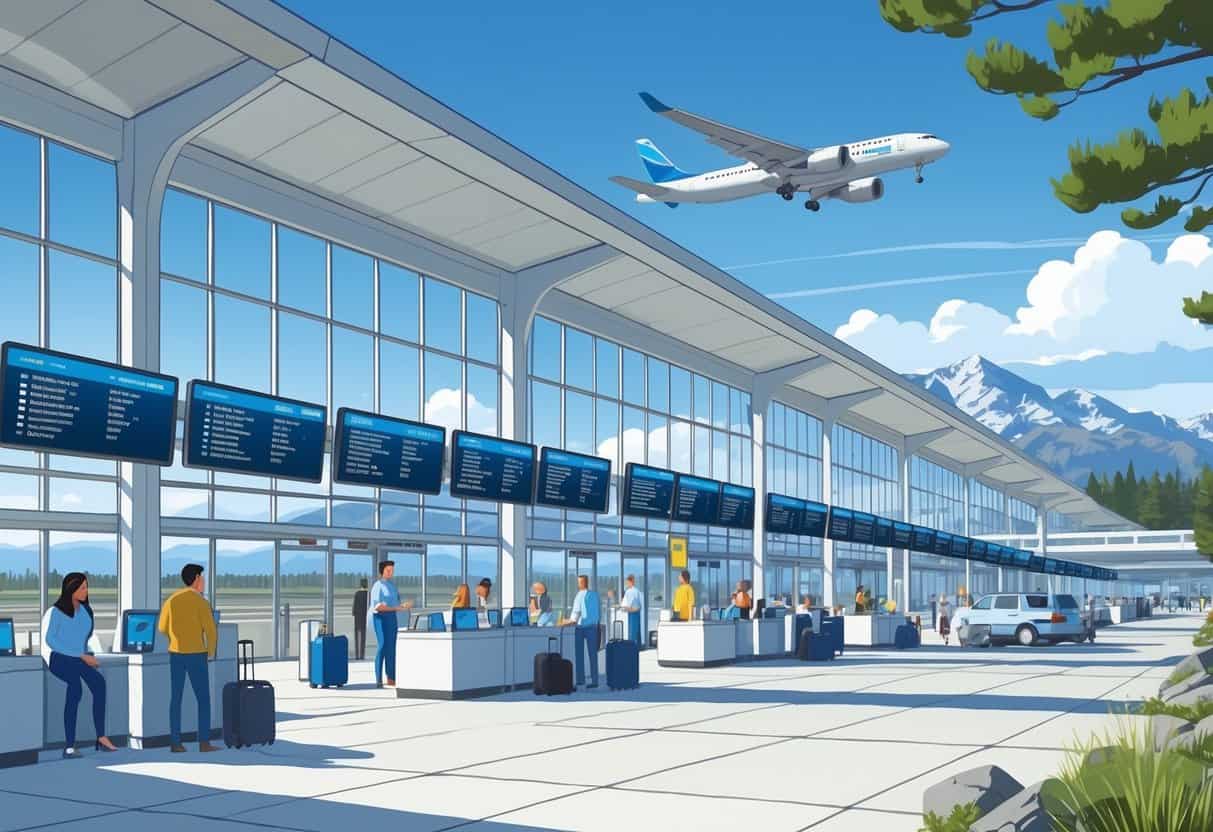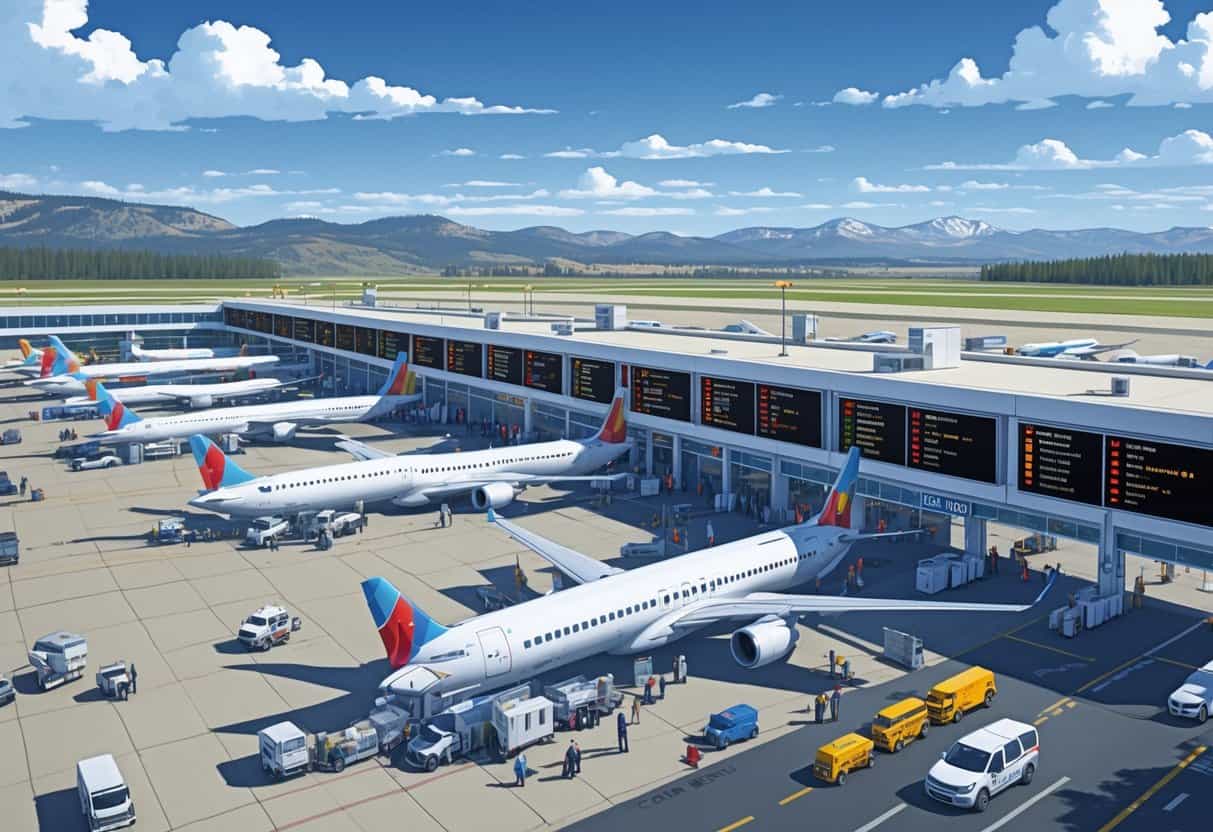Table of Contents
If you’re flying in or out of Fort Collins, Colorado, cancelled flights can really throw a wrench in your plans. Knowing which nearby airports handle cancellations better might just save you some serious stress.
Northern Colorado Regional Airport (FNL) is a solid choice for passengers seeking reliability and support when flights get canceled.

This airport is owned by the cities of Fort Collins and Loveland. It offers a handful of services that actually help when your plans fall apart.
While Denver International is nearby, smaller airports like FNL tend to get you help faster and rebook you with less fuss. It’s honestly worth knowing your options—sometimes just having a backup plan makes all the difference.
Key Takeways
- Regional airports near Fort Collins often provide better support for cancellations.
- Smaller airports usually mean quicker help for passengers.
- Planning ahead can soften the blow when flights get canceled.
Top Airports for Cancelled Flights Near Fort Collins

Looking at airports around Fort Collins, it’s smart to think about how often flights get canceled and how easy it is to find alternatives. Some airports are just more reliable, plain and simple.
Northern Colorado Regional Airport
Northern Colorado Regional Airport (FNL) is the closest one you’ll find. It only has a handful of commercial flights each week.
With fewer flights, cancellations aren’t as common, but they can still happen if the weather goes south or demand drops. Don’t expect many direct flights from FNL to big hubs like Chicago O’Hare (ORD) or Frankfurt (FRA).
Most routes connect through larger airports, so you’ll usually have a layover. Public transport to FNL is pretty limited—worth planning for that ahead of time.
The upside? It’s easy to get in and out, and it’s never too crowded. That means fewer delays because of congestion.
But if your flight does get canceled, there aren’t a ton of alternatives, so you might be stuck waiting longer than you’d like.
Major Nearby International Airports
Denver International Airport (DEN) is the big one nearby, and it’s a major hub. Denver handles a ton of flights every day, including international routes to places like Munich (MUC) and Singapore (SIN).
DEN does see more cancellations during nasty winter storms. The rest of the year, though, it’s usually pretty reliable.
There are plenty of backup flights if yours gets canceled, which is a huge plus. You’ll have no trouble comparing flights at Denver International since there are so many direct routes to big cities.
Getting to Denver is easier, too—public transport is way better developed compared to FNL. It’s a good option if you need flexibility or have to change plans last minute.
Key Amenities and Passenger Support Options
When your flight gets canceled, you’ll want somewhere to stay and a way to get around. Fort Collins airports do offer some decent options to make the wait less painful.
On-Site Hotels and Accommodation
FNL doesn’t have hotels right in the terminal, but there are several close by. You’ll find the usual chains like Holiday Inn and Best Western within about ten minutes’ drive.
A lot of these hotels run shuttles to and from the airport, which is a huge relief after a long day. Booking ahead is smart, especially during busy seasons.
Some hotels have flexible cancellation policies, which is a lifesaver if your plans keep shifting. Having a nearby hotel means you can actually rest and get Wi-Fi or a meal without stress.
Car Hire and Public Transport
You can rent a car at FNL or in Fort Collins itself. Enterprise, Avis, and the other big names are there.
Renting a car lets you bail out on your own schedule if your flight’s delayed or canceled. Public transport from the airport isn’t great, but within Fort Collins, you can catch local buses.
Just check the schedules—they’re not always super convenient. If you want something faster, private shuttles or rideshares are available and can drop you right at your hotel or wherever you need to go.
Strategies for Minimizing Disruption and Costs
No one wants to deal with cancellations, but you can at least try to keep the hassle and costs down. Picking the right ticket and having some financial backup is honestly a good move.
Comparing Flights and Flexible Ticket Options
When you book, look for flexible tickets. They let you change or cancel your flight if things go sideways.
Sure, they cost a bit more, but it’s often worth it if your plans aren’t set in stone. Direct flights are usually safer bets than ones with connections—fewer chances for things to go wrong.
Use apps or websites to compare flight prices and flexibility side by side. That way, you can find a good deal without sacrificing peace of mind.
Don’t forget to check the airline’s policies on changes and cancellations. Some budget airlines look cheap upfront but hit you with fees if you need to switch things up. Going with airlines known for decent customer service can really help if your plans suddenly change.
Travel Insurance and Cost Protection
Buying travel insurance is honestly one of the best ways to protect your trip—and your wallet. Good policies usually cover cancellations from things like bad weather, illness, or airline problems.
Double-check if your insurance actually includes travel cost protection for things like flights, hotels, and activities you might miss. You really don’t want to find out later that your policy skips the stuff you care about.
When you’re picking insurance, take a moment to read the fine print about what’s covered and how claims work. Some plans only kick in for pricey ticket classes, so make sure your economy flight isn’t left out.
If you’re booking through a travel site, see if they offer bundled insurance. Sometimes you’ll get a better deal or a little extra thrown in when insurance is part of the package. That little bit of peace of mind can be worth it, especially if it doesn’t cost much more.